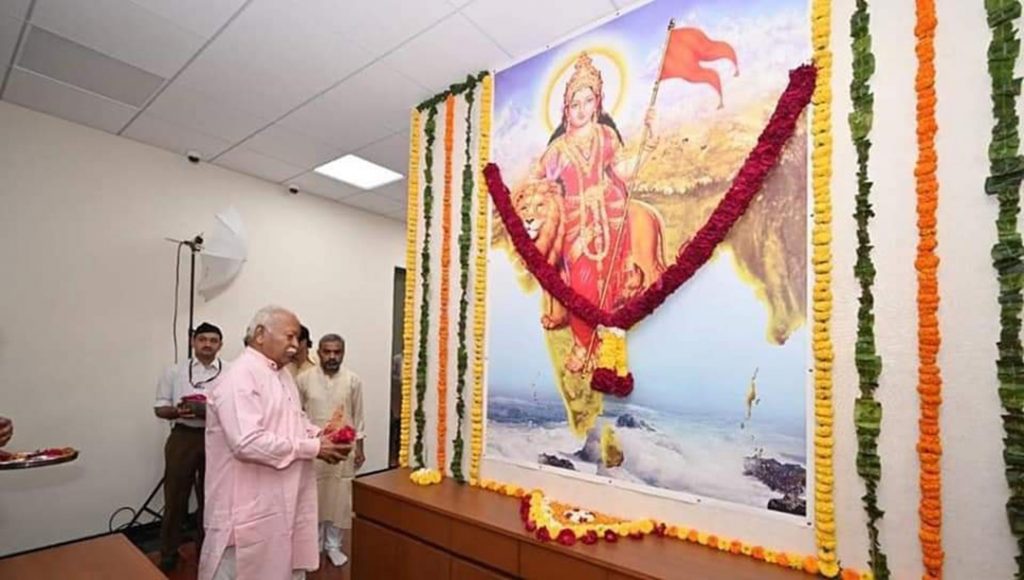Hindu nationalism is at the core of the Rashtriya Swayamsevak Sangh’s ideology. Intellectuals influenced by the Western political thought and Marxism have often interpreted it as a communal ideology which is detrimental to the interests of the minorities. But nothing could be farther away from the truth.
Though the concept of Hindu nationalism dates back to the Vedic age, but in recent times Deendayal Upadhyaya, an ideologue and pracharak of Rashtriya Swayamsevak Sangh(RSS) who propounded the philosophy of ‘Integral Humanism’ defined the concept of Hindu nationalism in a series of lectures delivered in April, 1965.
His thoughts have influenced the contemporary framework of Hindu nationalism to a great extent. A multi-volume series titled ‘Deendayal Upadhyay: Ideology and Perception’ was published in 1988 which deals in detail with different aspects of patriotism and national consciousness in context of Hindu Rashtra and Hindu nationalism.
CP Bhishikar, another RSS stalwart, dwelt upon these aspects in the fifth volume in the above-mentioned series. Elaborating on Upadhyaya’s conceptual framework, Bhishikar explained that an integrated society has been living as one nation in Hindusthan, the ancient land of ours for thousands of years. Page after page of our history records events showing this nationalist feeling. Right from the Vedas, the word Rashtra is profusely in use. In the Shri Sukta or Shri Lakshmi Strota which is regularly recited by millions of Hindus, there is an invocation to the Goddess Lakshmi which contains the line (in Sanskrit), ‘Pradurbhuto Surashtreasmin Keertinridhim Dadatu’ (Since I was born in this excellent Rashtra, may glory and prosperity come to me!). There is pride in this and also devotion to the Motherland. Has not some deep thinking gone behind this national life, its fundamental principle, the direction of the incentives and motivations behind all actions of individuals and society, duties and taboos, the rise and fall of society, the happiness and misery of the society and individuals here during thousands of years? Was it from the British that we learned patriotism? Or have our predecessors thought about the inspiring strength of patriotism? If so, what is that thought? Is it in harmony with modern times?
Upadhyaya had deliberated on these problems and provided answers to these questions. According to Upadhyaya’s explanation, as analysed by Bhishikar, it will have to be accepted that there is a common theme behind all the thinking in this sphere all over India. It has got completely identified with the Hindu spiritual thought. Hindu philosophers have time and again used the metaphor of the human body. The human body is concretely visible to everyone; but no one presumes that the body is the complete man. What is that light or impetus that enables our organs of cognition and organs of action to execute their respective functions? The Hindu philosophers have looked upon the spirit or the soul as the invisible, changeless and continuous force behind all these activities. A living body is inconceivable without a soul, this soul-force sustains the life-force, in the absence of which the body is rendered lifeless and destroyed. The same is true about a Nation.
In the ancient Indian texts, the science of patriotism was well-defined and it was given the name of ‘Daishik Shastra’-the branch of knowledge that studied the nation. According to Bhishikar, this is a word which is now obsolete, but which literally means Science which deals with the protection of the nation. Patriotism, in the context of Hindu nationalism, is just another connotation of ‘Daishik Shastra’. It appears that the Indians thought about this life-force of the nation in the most scientific manner.
Upadhyaya, in his treatise on the concept of nation, talks in detail about the inherent national spirit that is at the core of Hindu nationalism. Bhishikar explains, “..According to our Daishik Shastra (Science of Patriotism), there is a vital element that gives nationhood to the people living in our territory, having the same language and the way of living, common triumphs and defeats, common friend-foe relationship and all other common aspects. This invisible vital element has been named by Chiti by our scholars in this branch of study. Pandit Deendayal Upadhyaya appears to have used the same scientific term in his theories about nationhood, says Bhishikar.
To put it simply, Chiti is the national spirit or the natural character of the nation. The writers of Daishik Shastra are of the opinion that a Nation cannot be simply created artificially, while a State can be so created. After World War II, a number of such states appear to have been formed. Quite a few institutions, big and small, can also be artificially formed. Man can create systems but a nation is born with a Chiti. The existence of the Chiti , its radical spirit is the same as the existence of the nation. When this inner consciousness of identity or Chiti is weakened, the nation becomes weak and with the destruction of Chiti , the nation loses its existence; its flowering is the nation’s flowering. Chiti is the very raison-d’tere of that nation. The nation experiences supreme happiness if it’s all-sided life follows this life-purpose.
